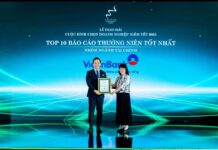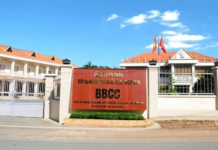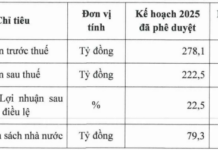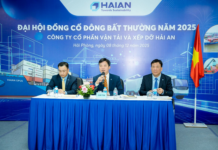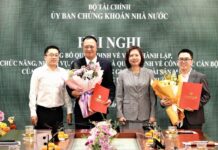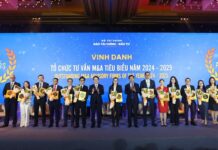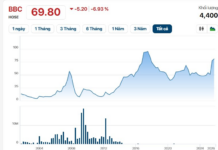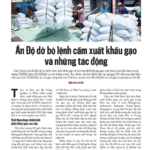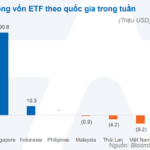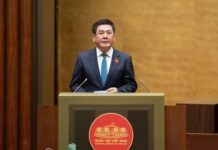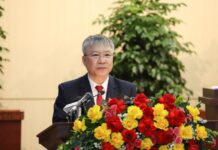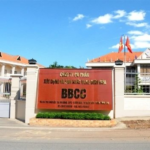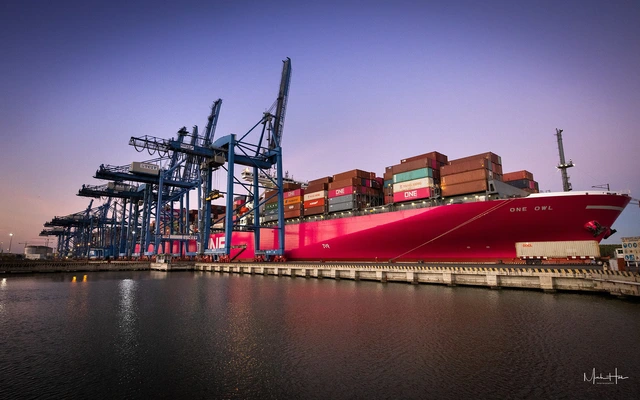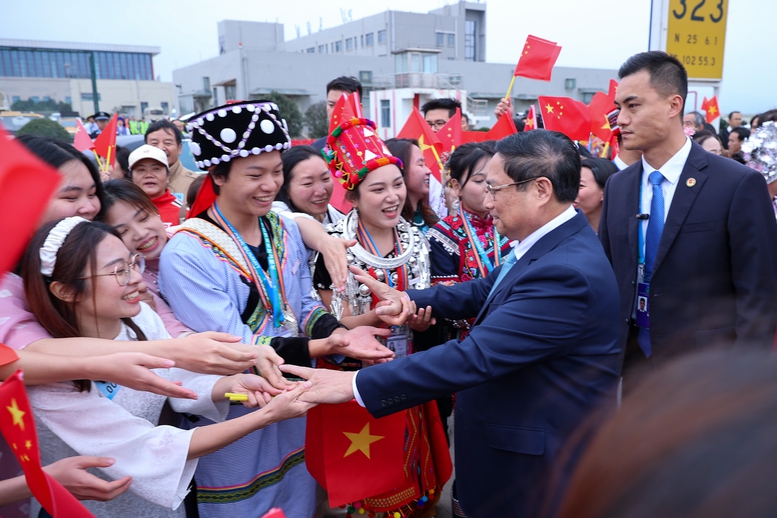
Ethnic minority youths from Yunnan Province enthusiastically welcomed the Prime Minister and the high-level delegation of Vietnam during their working trip to China – Photo: VGP/Nhat Bac
The working trip was a great success in terms of multilateral and bilateral cooperation, with a diverse range of activities and partners, and substantive content.
Conveying meaningful messages to the sub-region, region, and international community
The 8th GMS Summit, 10th ACMECS Summit, and 11th CLMV Summit, which were held for the first time in six years and marked significant milestones for Mekong sub-regional cooperation, concluded successfully.
At the Summits, leaders outlined key directions for sub-regional cooperation, including integrating the Mekong sub-region into the global development landscape, strengthening the internal strength of economies, and fostering unity and solidarity among member countries to tackle common challenges together.
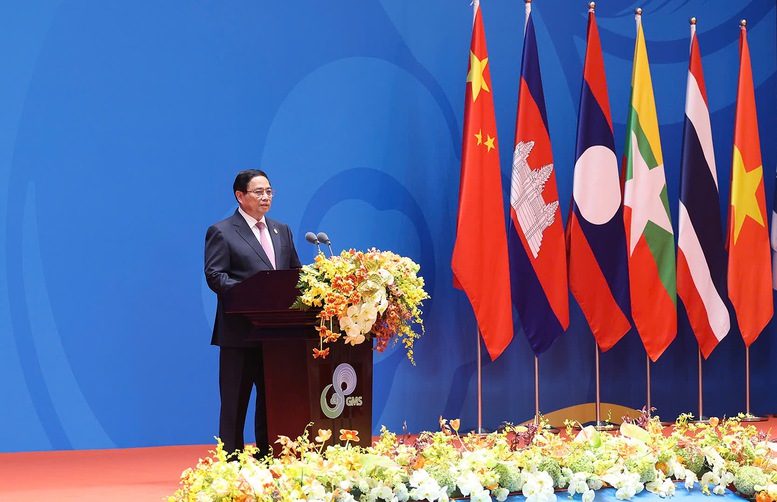
The Prime Minister delivered a speech at the 8th Summit of the Greater Mekong Subregion (GMS) Program – Photo: VGP/Nhat Bac
The Summits adopted important documents such as the GMS Strategy for Innovation, Technology Transfer, and Transformation until 2030, the Joint Statement of the Leaders of the GMS, ACMECS, and CLMV Cooperation. Leaders instructed ministers, senior officials, and experts to develop and implement practical and highly feasible programs and projects in priority areas of cooperation.
With a packed schedule over three and a half days, Prime Minister Pham Minh Chinh and the Vietnamese delegation conveyed significant messages to the sub-region, region, and international community, underscoring Vietnam’s proactive, positive, and responsible contributions to the development of the Mekong sub-region, as well as its commitment to fostering friendly and cooperative relations with host China and other partners.
At the Summits, Prime Minister Pham Minh Chinh offered insightful and heartfelt assessments and suggestions, introducing new approaches, ideas, and practical proposals to bring about breakthrough development for all three cooperation mechanisms.
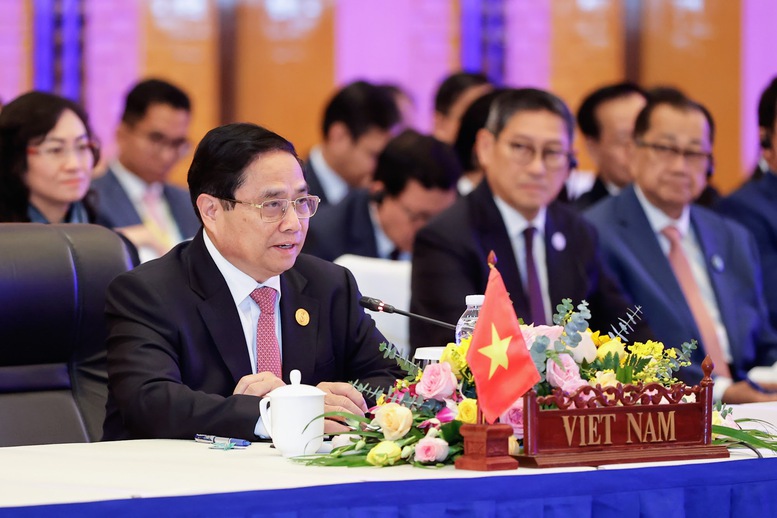
The Prime Minister proposed six key contents for ACMECS cooperation to achieve a breakthrough at the 10th Ayeyawady-Chao Phraya-Mekong Economic Cooperation Strategy (ACMECS) Summit – Photo: VGP/Nhat Bac
The Prime Minister’s statements and activities provided accurate and timely insights into the prominent characteristics of the development environment and major trends, helping to define the role and mission of each mechanism in the new era.
According to the Prime Minister, the world is entering an era of connectivity and integration, an era of science, technology, and innovation. Therefore, innovation must be placed at the core of GMS cooperation as it is an inevitable trend, a strategic choice, and a top priority for rapid and sustainable development.
As part of this dynamic development, the Greater Mekong Subregion must continuously innovate and create, both to keep up with global trends and to meet the unique needs of the sub-region.
“It is time for the sub-region to focus on developing new-generation economic corridors, with innovation at their center, transcending the limitations of traditional economic corridors,”
the Prime Minister emphasized.
The Prime Minister proposed that GMS focus on developing new-generation economic corridors with innovation at their core, that ACMECS define its new mission as building a community of Mekong countries that is united, strong, and sustainably developed, and that CLMV’s new focus should be on creating breakthroughs by harnessing internal strengths, external resources, and solidarity to overcome challenges.
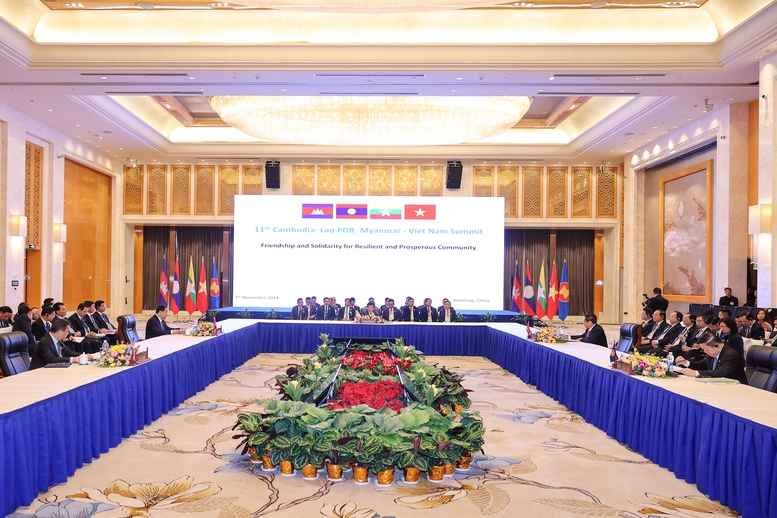
The Prime Minister delivered a speech at the 11th Cambodia-Laos-Myanmar-Vietnam (CLMV) Summit – Photo: VGP/Nhat Bac
In particular, Prime Minister Pham Minh Chinh proposed three main aspects of the new-generation economic corridors: corridors of technology and innovation, aiming for multi-stakeholder, multi-sectoral, and multi-phase connectivity; corridors of economic growth, both revitalizing traditional growth drivers and promoting new ones; and green, sustainable, and inclusive corridors, ensuring a balance between economic growth and environmental protection, with people at the center as the driving force, the resource, and the goal of development.
At the same time, the Prime Minister outlined important principles and guidelines to enhance effective cooperation, better meet the needs of the members, and promote shared prosperity.
The Prime Minister emphasized the “4 Together” approach: listening and understanding together; sharing vision and action together; doing, enjoying, and winning together; and developing, sharing joy, happiness, and pride together.
The Prime Minister highlighted five valuable lessons: conducting equal and extensive consultations to build consensus among members for mutual benefit; developing substantive strategies and programs that are aligned with the practical needs of each country and the sub-region; focusing cooperation on people and communities; promoting economic connectivity in tandem with environmental protection; combining the efforts of each member with the support of the Asian Development Bank (ADB) and development partners; and turning challenges into opportunities by fostering unity and determination to overcome difficulties together.
The Prime Minister also emphasized the “6 Connects” principle: connecting thinking and action; tradition and modernity; rapid growth with sustainable development; the nation with the region and the world; the government with the people and businesses; and development with maintaining stability and ensuring security. Particular attention should be given to effective, sustainable, equitable, and reasonable management and use of the shared Mekong-Lan Cang river, as well as technology application in transboundary water resource management.
“In today’s complex world, we need to unite and cooperate more closely and effectively to overcome comprehensive, global, regional, and national challenges. We must stand together to reject the politicization of science, technology, innovation, and trade and investment,”
the Prime Minister shared.
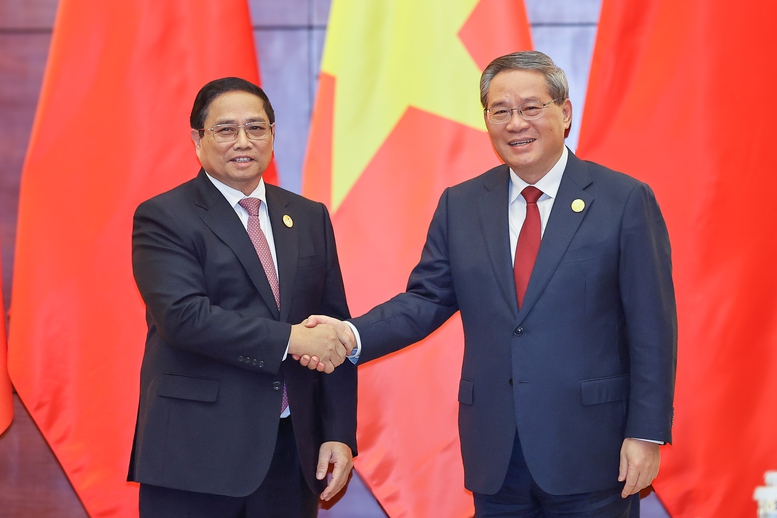
Prime Minister Pham Minh Chinh held talks with Chinese Premier Li Qiang – Photo: VGP/Nhat Bac
Recalling the Chinese saying, “sharing the same boat, moving forward together,” and Ho Chi Minh’s words, “unity brings strength,” Prime Minister Pham Minh Chinh affirmed that Vietnam would continue to work closely with member countries and development partners to build an innovative, dynamic, and sustainably developed Greater Mekong Subregion.
These profound insights were well-received by the leaders and delegates. They particularly appreciated the Prime Minister’s view on
“valuing time, valuing wisdom, innovating to break through, creating to reach out, integrating to move forward, and uniting for added strength.”
Lao Prime Minister Sonexay Siphandone, in his opening remarks at the CLMV Summit, highly appreciated Vietnam’s positive contributions and leading role in promoting cooperation within this mechanism.
Vietnam has also made very specific and practical contributions to the cooperation mechanisms.
At the Summits, Prime Minister Pham Minh Chinh announced that Vietnam would contribute $10 million to the ACMECS Fund and continue to implement a scholarship program for students from Cambodia, Laos, and Myanmar to study and research in Vietnam.
On this occasion, Prime Minister Pham Minh Chinh held in-depth discussions with the Prime Ministers of Laos and Cambodia on measures to promote bilateral and trilateral cooperation in the new development phase, in the spirit of trust, solidarity, and mutual understanding. The leaders agreed to strengthen cooperation in strategic areas such as infrastructure, transportation connectivity, energy, finance, and people-to-people exchanges.
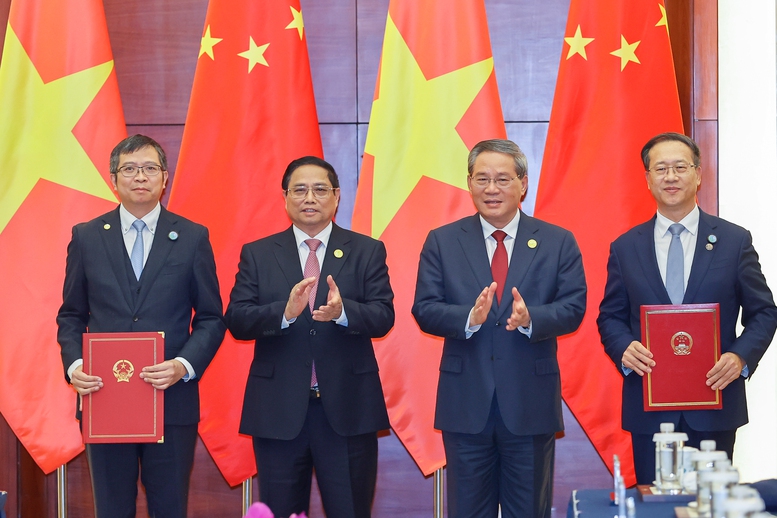
Prime Minister Pham Minh Chinh and Premier Li Qiang witnessed the exchange of diplomatic notes on the establishment of the Vietnamese Consulate General in Chongqing, China – Photo: VGP/Nhat Bac
Toward an important milestone in bilateral relations
Prime Minister Pham Minh Chinh’s working trip to China took place amid positive developments in Vietnam-China relations, both qualitatively and quantitatively, after the two sides agreed to upgrade their relations to a comprehensive strategic cooperative partnership and build a shared future community with strategic significance (December 2023).
Moreover, the two countries are also looking forward to celebrating the 75th anniversary of the establishment of diplomatic relations in 2025 (January 18, 1950 – January 18, 2025), a significant milestone in the development of the two Parties and countries. Shortly after its establishment, the People’s Republic of China was the first country in the world to establish diplomatic relations with the Democratic Republic of Vietnam (now the Socialist Republic of Vietnam).
Prime Minister Pham Minh Chinh had a rich program with 19 bilateral activities, including talks with Chinese Premier Li Qiang; witnessing, together with Premier Li Qiang, the exchange of diplomatic notes on the establishment of the Vietnamese Consulate General in Chongqing; meetings with leaders of Yunnan Province, Chongqing City, and the Guangxi Zhuang Autonomous Region; visiting the Ho Chi Minh Relic Site in Kunming and the Hongyan Revolutionary Site in Chongqing – places that bear the imprint of President Ho Chi Minh’s revolutionary activities; attending the Vietnam-China Business Forum and cultural-tourism promotion programs; meeting with several leading Chinese businesses; and meeting with the Vietnamese community living, studying, and working in China.
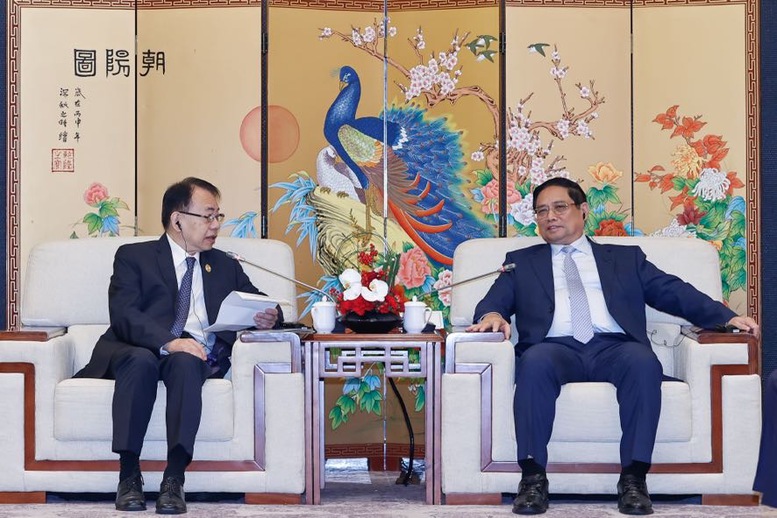
Prime Minister Pham Minh Chinh met with Mr. Masatsugu Asakawa, President of the Asian Development Bank (ADB) – Photo: VGP/Nhat Bac
During the talks and exchanges with Premier Li Qiang and the leaders of Yunnan, Chongqing, and Guangxi, the two sides reached many important common perceptions on continuing to implement and concretize high-level common perceptions, promoting Vietnam-China relations, and developing relations between Vietnam and Chinese localities in a more effective, practical, and sustainable manner, reflected in four aspects.
First, strengthen political trust between the two sides, emphasizing the important guiding role in the development of bilateral relations.
Prime Minister Pham Minh Chinh and Premier Li Qiang, along with the leaders of Chinese localities, highly appreciated the positive trend of relations between the two Parties and countries and between Vietnamese and Chinese localities. They agreed to maintain regular flexible contacts between high-level leaders and promote exchanges and cooperation through Party, government, parliamentary, and people’s channels. The 16th meeting of the Vietnam-China Steering Committee for Bilateral Cooperation will be held in 2024.
Second, deepen substantive cooperation in various fields, consolidating the material foundation of bilateral relations.
The two sides agreed to leverage their complementary strengths and focus on implementing large-scale, symbolic new cooperation projects in the Vietnam-China relationship.
Third, enhance people-to-people exchanges, further solidifying the social foundation of bilateral relations.
The two sides agreed to effectively implement activities for the Vietnam-China Year of People-to-People Exchange in 2025, considering it an opportunity to promote people-to-people exchanges and spread friendship; boost tourism recovery; and promote the role of “red addresses” bearing the revolutionary imprint in Yunnan, Chongqing, and Guangxi.
Fourth, the two sides agreed to properly manage differences, preventing them from affecting the very positive relationship between the two Parties and countries.
At the same time, they will closely coordinate in border management and protection in accordance with the three legal documents on land border and related agreements, jointly organizing activities to celebrate the 25th anniversary of the signing of the Land Border Agreement and the 15th anniversary of the signing of the three legal documents on land border in 2024.
Unlocking the Power of PPPs: Harmonizing Interests and Sharing Risks for Mutual Success
It is believed by several National Assembly delegates that in order to unblock the “bottleneck” in infrastructure projects, especially in the field of transportation, it is necessary to devise harmonious solutions that balance the interests and risks of all involved parties when it comes to implementing investment projects through the public-private partnership (PPP) model.
The $67.3 Billion Super-Project: Europe Watches Vietnam’s 1,541km Mega-Enterprise with Keen Interest
The European Ambassador to Vietnam expressed keen interest in and close observation of the National Assembly’s ongoing review of the key project.
Unlocking India’s Rice Exports: Exploring the Impact
The Indian government’s decision to lift the ban on common rice exports has resulted in a $24/ton decrease in Vietnam’s rice export prices in October 2024 compared to the previous month. However, as of now, Vietnam’s 5% broken rice remains more expensive than that of Thailand by $16/ton and India by $46/ton.
The Great ETF Snub: Vietnam Left Out in the Cold Despite Southeast Asia’s Allure
Week 04-08/11/2024 saw a significant wave of capital outflows across multiple Asian markets, with Vietnam recording a notable foreign net withdrawal of up to $144 million, equivalent to VND 3,600 billion. Among this, ETFs withdrew $9.2 million, contributing to the overall outflow. This period marked a notable shift in investment trends, highlighting the dynamic nature of global financial landscapes and the intricate interconnectedness of international markets.







